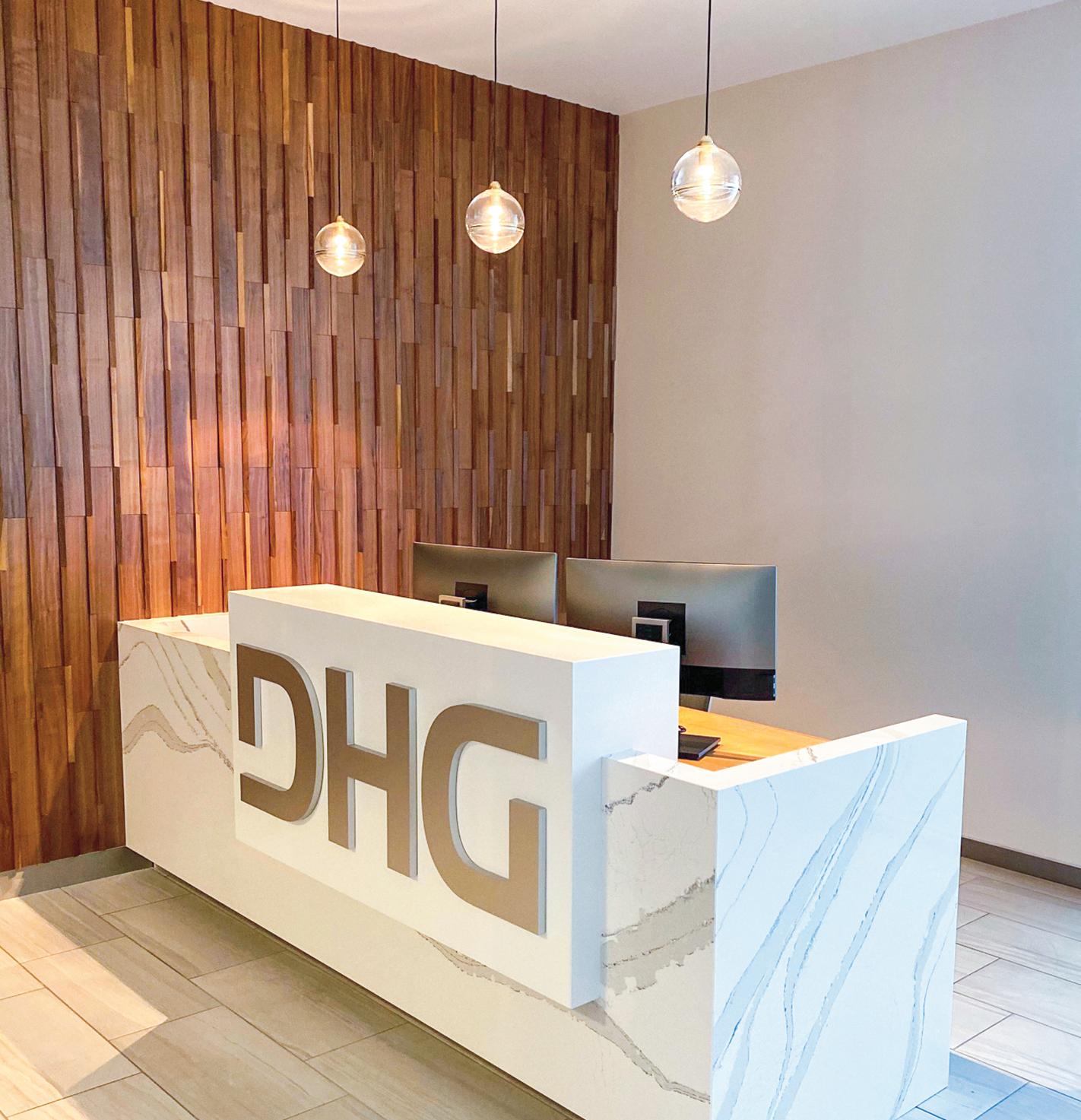
8 minute read
DHG: Deal-making in Texas
Ryan Irby, Partner, Transaction Advisory Practice, DHG
DHG
Advertisement
Opportunities Abound in Texas
Why deal-makers are flocking to the Lone Star State
States such as New York, California and Illinois—often considered the economic powerhouses of the nation—have lost headcount during the past decade, according to the U.S. Census Bureau’s latest figures. Texas did just the opposite, thanks to an influx of people and businesses that are, in turn, putting the state on the map as a hub for M&A.
Census Bureau figures show Texas gained nearly 4 million residents from April 2010 to April 2020, bringing the state’s population to 29,145,505. The Lone Star State’s population grew so much between 2010 and 2020 that it roughly swallowed the state of Oklahoma, whose entire population totaled 3,959,353 as of April 2020.
Texas led the nation for the sheer number of residents added over the last decade. It holds the No. 3 position for percentage population growth from 2010 to 2020, according to Census Bureau data. The state’s population shot up by 15.9% during that period, behind only Utah (18.4%) and Idaho (17.3%).
While this may surprise some, it’s a trend Texans and deal-makers have been watching for years.
“Texas has been a hotbed of activity. The state has a welcoming environment for a number of reasons,” says Ryan Irby, a partner in the Transaction Advisory practice of Dixon Hughes Goodman, a U.S.-based professional services firm.
For one, the state’s economy has developed beyond the industries historically associated with Texas, such as ranching and energy. It’s not tied to one or two industries anymore, according to Irby, and that breadth makes it attractive to all kinds of people and businesses. Additionally, there is a pro-business environment with a strong talent pool. “You are seeing more and more businesses and people move to Texas to take advantage of the great things the state has to offer,” Irby adds.
Businesses are certainly relocating to Texas. According to the governor’s Economic Development and Tourism office, there are 237 relocation or expansion projects currently in the works. That doesn’t include the big-name companies that have moved recently or are planning to relocate. For example, Oracle moved its headquarters to Austin in 2020, while Apple opened its second-largest campus in Texas. Tesla is currently building a factory in the state.
With more than 25 colleges and universities, Texas offers businesses a strong labor pool. College graduates tend to stay in the state after graduation because of the low cost of living and the abundance of job opportunities. “We have excellent talent here coming out of great schools like The University of Texas, Texas A&M, Baylor, SMU, TCU, Texas Tech, Rice, etc.,” Irby says. “Texas is a very attractive and business-friendly place for investors, owners and operators. Fundamental factors such as the absence of personal taxes, affordability, well-developed transportation infrastructure, low levels of business regulations, a central location and skilled workforce diversity creates momentum and bodes well for the future.”
These trends are not lost on deal-makers, who are flocking to Texas—as evidenced by recent strong M&A activity. Year-over-year, deal value tied to Texas-based companies and private equity jumped by 201.5% in the first quarter of
Photo by Justin Clemons
DHG is registered in the U.S. Patent and Trademark Office to Dixon Hughes Goodman LLP.

TIM YORK
Managing Partner of Performance, DHG
2021, according to Mergermarket data provided exclusively to The Texas Lawbook.
Mergermarket reported that 25.5% of Q1 deals (81 deals; $19.6 billion) were tied to technology by value, followed by energy, mining and utilities with 17.4% (32 deals; $13.4 billion), and industrials and chemicals at 13.5% (50 deals; $10.4 billion).
As for where deal-makers are transacting within Texas, the Dallas-Fort Worth area, Austin and Houston top the list.
DALLAS-FORT WORTH
Tax incentives have made Dallas-Fort Worth a booming place for business. DFW was able to successfully attract many businesses such as Comerica Bank and Toyota North America, among others, to relocate.
“You have two world-class cities in a 30-mile distance. Dallas has evolved into a large financial services, manufacturing and distribution hub today, and Fort Worth is rapidly expanding with a growing technology and health care community,” Irby says.
Private equity firms are attracted to businesses that service the region’s growing population. The Halifax Group, a private equity firm with a niche for investing in franchise businesses, swallowed up a slew of Orange Theory Fitness (OTF) chains in the DFW area. OTF offers a high-end, distinct workout concept backed by science that caters to a customer base of mid-to-upper-class professionals—perfect for the DFW area.
“OTF is head and shoulders above the competition when it comes to a workout program, and we knew the DFW population would take to it,” says Chris Cathcart, a managing partner with The Halifax Group. “DFW has had meaningful population growth and has been resilient in downturns like the Great Recession, which makes it an attractive market for us. You want to invest where you have natural population growth, and that’s what we are seeing in the DFW area.”
The appeal to investors extends beyond just population growth, Cathcart adds. “DFW has benefited from business- and growth-friendly economic policies and low taxes. The climate doesn’t hurt, and the universities attract an educated and well-trained population,” he says. “A number of factors are snowballing to make DFW a great place to invest.”
Halifax has purchased 34 OTF studios in the DFW area over the last two years, and the DHG team has helped at every step of the way. “The OTF deal is a testament to Texas,” says Steven Frank, a partner in DHG’s Transaction Advisory practice, who has completed quality of earnings reports on the OTF companies for Halifax. “This brand is perfect for the current demographics of DFW,” he says.
“We have known DHG for a number of years and they have been a fantastic partner. In our industry it’s important for service providers to not only be excellent practitioners, but also have commercial expertise, which they do. DHG
understands our objectives, how we look at accounting and helps us make smart value-creation decisions for our businesses,” says Cathcart.
Despite some hiccups that COVID-19 caused, Halifax’s OTF business is still projected to show growth. “We have let the membership dictate how they want to move forward, but the membership base has been strong throughout. They love the concept and want to be a part of it. That’s what makes it so attractive,” says Bryan Wallace, OTF’s vice president of finance.
DHG is certainly excited about working in the DFW area. “The Dallas-Fort Worth area offers DHG great opportunities to put our technical knowledge and industry intelligence to work for the businesses here. Our focus on the future helps our clients achieve their goals and allows us to give back to the local community. That’s been our approach for more than 20 years and that’s how we’re looking to the future,” says Tim York, managing partner of performance with DHG.
AUSTIN
Austin is considered an up-and-coming city with a great growth trajectory. “Austin has a really unique vibe with great food, live music and an overall buzz,” Irby says.
The city has become popular with the tech crowd. Dell Computers was founded in the city and tech giants from all over the country have been relocating to the area ever since. Companies such as Apple, Facebook, Tesla and Oracle have all relocated to the city. According to the census, 56 companies relocated to Austin in the past 10 years. Since 2010, 94 company headquarters moved from California to Texas. Twenty-eight of those companies settled in Austin.
Deal-makers are ready to take advantage of what Austin has to offer. In April, Austinbased Arrive Logistics received a $300 million investment from ATL Partners. Founded in 2014, Arrive is a tech company that specializes in working with shippers and carriers to move products and supplies. In addition to expanding its workforce, proceeds from the new investment will let Arrive continue to invest in its technology and create new service offerings.
Other sizeable investments in Austin companies this year include software maker Quali, which received $54 million, and tech-enabled mortgage platform UpEquity, which raised $25 million.
“There is an entrepreneurial spirit that the community welcomes. It is becoming a technology-focused city, and is sometimes referred to as the new Silicon Valley. This culture is becoming more and more prevalent in Austin every day,” Irby says.
HOUSTON
Although Houston is still considered an oil town, it is diversifying. Last month, EnCap Investments raised $1.2 billion for its first fund dedicated to renewable-energy project developers, securing nearly two-thirds of the capital in the past six months.
The Houston-based private equity firm launched EnCap Energy Transition Fund I LP in 2019 after investing exclusively in the oil-andgas sector for the past three decades.
“Houston still lives and breathes oil, but a variety of other industries are also growing, from health care to technology and manufacturing,” Irby says. “Houston is a city to watch, particularly as the market continues to capture investors’ attention going forward.” //

Select businesses that have recently moved or are moving to Texas: ɋ Apple: Austin, 2021 ɋ Caterpillar: Las Colinas,
April 2021 ɋ CBRE: Dallas, October 2020 ɋ Charles Schwab: Dallas,
November 2019 ɋ Google: Houston, March 2021 ɋ Hewlett Packard Enterprise:
Houston, December 2020 ɋ Oracle: Austin, December 2020 ɋ Samsung: Austin, January 2021 ɋ Tesla: Austin, December 2020 ɋ Wayfair: Austin, April 2021









